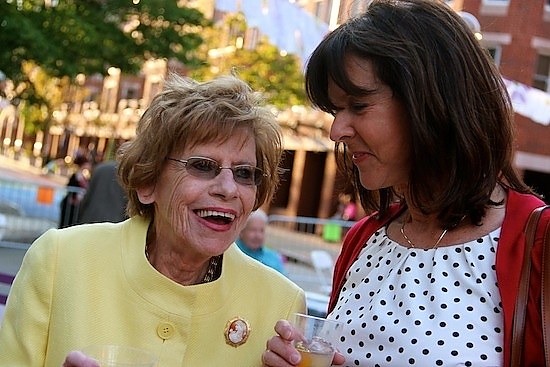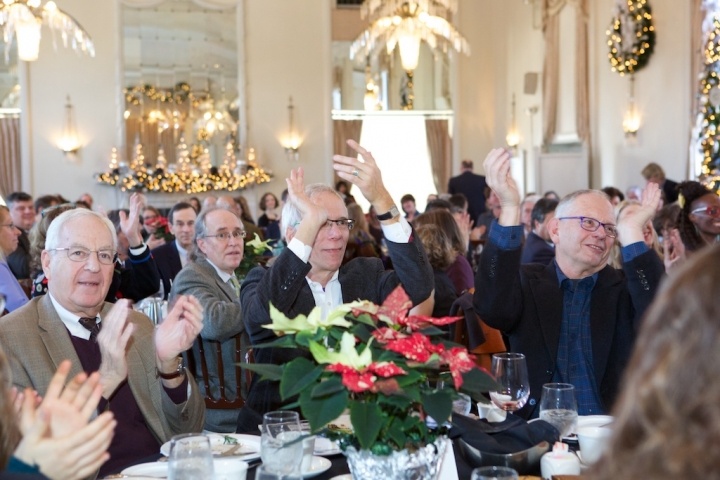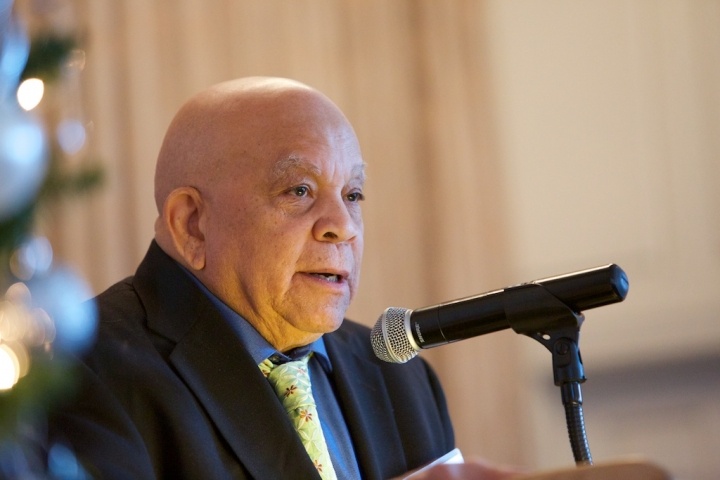
Culture & Community | Frances "Bitsie" Clark | Arts & Culture | New Haven | The Arts Council of Greater New Haven
As Arts Awards nominations enter their final week, a stalwart member of The Arts Council of Greater New Haven is looking back — and thinking about what she’d like to see as the ceremony moves forward under new leadership.
That woman is Frances “Bitsie" Clark, a longtime supporter of The Arts Council who has served as event planner, budget balancer, mission shaper, executive director, board member, unofficial historian and taskmaster for the organization in its last several decades. Now that its awards are almost 40 years old, she is looking back on some of its earliest and most memorable years, and encouraging New Haveners to submit to this year’s while they still can. The deadline is this Thursday, Sept. 14, at 5 p.m.
 A table at the 2015 Arts Awards. Judy Sirota Rosenthal Photo.
A table at the 2015 Arts Awards. Judy Sirota Rosenthal Photo.
Hosted by the Arts Council of Greater New Haven, the Arts Awards is an annual luncheon and awards ceremony celebrating New Haveners—mostly artists, but also entrepreneurs and financial supporters—who have shown robust and longterm dedication to arts and culture in the city.
Under new Arts Council Director Daniel Fitzmaurice, this year’s theme is “Creative Ecosystem,” exploring “who is radically expanding the word ‘art’ to influence entrepreneurship, social justice, food, or health.” After nominations are in, winners will be selected by a jury of previous winners and New Haveners active in the arts and cultural community. The winner of this year’s C. Newton Schenck III Award for Lifetime Achievement in and Contribution to the Arts, already selected by The Arts Council, is Yale University Art Gallery Director Jock Reynolds.
“My goal for the Arts Awards is to broaden its role by recognizing all types of creatives who have made lasting contributions to our community,” Fitzmaurice said via text message Sunday night. “The theme this year reflects the shift to particularly celebrate the lesser-known but essential players in our ecosystem.”
He added that he hopes to make it a less white celebration that it has been in the past.
For Clark, the annual celebration is a chance to look back at previous ceremonies. By her estimation, the awards have two starting dates: The early 1970s and 1979, when board member Jack Smith suggested to then-director Baker Salisbury that “The Arts Council was really in the position to make these awards” to the community. No one else was doing it, Smith reasoned, so the organization could be the arts trailblazers that the city needed.
But the exact date that they started is contested. In the early 1970s, Creative Arts Workshop (CAW) co-founder Ann Lehman told Clark that she had been invited to some sort of celebratory tea on St. Ronan Street in East Rock, where she received an award for her contribution to the arts community. Lehman pegged it as the first-ever iteration of an “arts sward,” even though there wasn’t been any sort of official publicity around the event.
 Professor Willie Ruff, Jr. accepts an award in 2015 (he was also a recipient in 2000). Judy Sirota Rosenthal Photo.
Professor Willie Ruff, Jr. accepts an award in 2015 (he was also a recipient in 2000). Judy Sirota Rosenthal Photo.
But nothing public came of that fête, and there wasn’t a ceremony the following year. To the contrary, “Everything stopped” in 1974, Clark recalled. Richard “Dick” Lee was no longer mayor, Richard Nixon was about to resign, and there was an oil boycott that stretched far beyond New Haven.
Until 1979, that is. In the not-yet Audubon Arts District—only The Arts Council, Creative Arts Workshop and The Foundry existed at that time—Salisbury planned an inaugural ceremony in which members of The Arts Council were responsible for choosing winners. From 1979 to 1981, The Arts Council commissioned a piece of art or performance for winners, holding the ceremony as a fundraiser at different sites around the city. “There were like one or two [awards] given every year,” Clark recalled. They included local arts luminaries like Paul Rutkovsky, head of the Papier Mache Video Institute.
Everything changed for the organization when Clark was hired in 1983, and tasked with working on making the awards a large annual affair. It was a time of transition for the organization: The Arts Council’s board “felt that Baker [Salisbury] shouldn’t be involved” in the selection process, Clark recalled, and for the first time ever an awards jury was introduced. One or two winners became four, and the jury started selecting organizations as well as individuals.
Clark was just getting started. In 1984, she moved the ceremonies to Long Wharf Theatre, consulted with the Arts & Business Council of New York, and helped get the first formal luncheon on its feet by 1985. She enlisted the community’s help to scour winners, pulling from different corners of the city by the late 1980s.
 Clark at The Arts Council's 50th birthday party on Audubon Street. Lucy Gellman File Photo.
Clark at The Arts Council's 50th birthday party on Audubon Street. Lucy Gellman File Photo.
In 1990, she oversaw The Arts Council as it added the C. Newton Schenck III Award for Lifetime Achievement in and Contribution to the Arts (of which she was a recipient in 2010), which gave the organization a chance to pick one awardee. By the time Clark had completed her 19-year tenure as executive director at The Arts Council, winners ranged from multimedia artists to organizations to social justice initiatives.
Reached via phone, Clark recalled some of her favorite winners, speakers, and moments at the awards, which she has continued to support as an honorary staff member of The Arts Council and executive director of HomeHaven.
In one, she remembered honoring a collective of 32 artists who, fed up by the lack of exhibition spaces in the city, formed a collective in the Esther’s Department Store building on College Street. The store had gone out of business as the neighborhood began to change, and the artists rented out the space, naming a two-week exhibition “Artists Working in New Haven.”
“They were really celebrated, and we thought they should get an award,” she said.
That was just the tip of the arts iceberg, she said. She recalled a speech by Doug Hughes, then artistic director at Long Wharf Theatre, in which Hughes told the audience about growing up poor, in a large family. All of his siblings had worked to support the family, he told the audience—except him, as he tried to find a career in acting. There was great resentment there, and one night at dinner a sibling pulled his food away from him as he reached for a second helping.
Hughes’ mother had been furious, he told the audience. She'd stormed into the room from the kitchen, oven mitt still in hand. “It is a poor family who can’t afford one artist!” she’d exclaimed.
“The crowd just went wild,” Clark said.
They’ve been going wild since, she added. “I think it’s been enormously interesting,” she said. “It [The Arts Council] has actually managed to have good times and bad times. Arts councils come and go, but this one has stayed around.”
Clark isn’t the only one asking New Haveners to submit their choices. Reached by phone Monday, 2016 winner David Sepulveda said he encouraged New Haveners to throw some names in the arts hat before Thursday afternoon.
“I was very surprised, that was my first reaction,” he said. He recalled that he had been in a state of confusion: he was initially on the jury, and then had been asked to step down by longtime Arts Council member Debbie Hesse. Sepulveda would later learn that that happened to those who received nominations. But at the time, he remembered thinking: ”Why was I fired [from the jury]? What did I do wrong?”
Sepulveda said he resisted accepting the award at first. "I thought 'Oh shit, I am going to have to make a speech,'” he said. But that hesitation gave way to some warm feelings about the organization. “This is a way the Arts Council raises significant funds . Even though I’m uncomfortable being in the limelight, it’s worth it,” he said.
I just hope that the entire affair does carry forward,” he added. “It’s important to recognize people who work in the community and who continue to boost the arts."
Echoing Fitzmaurice's hope for a more diverse awards this year, Sepulveda added that "I would love for more people who aren’t directly related to the arts community to be able to experience these awards."
Nominations for the 37th Annual Arts Awards are due at 5 p.m. Sept. 14. Submissions for women and artists of color are particularly encouraged this year, as The Arts Council works toward greater diversity. Click here for the nomination form and directions.

